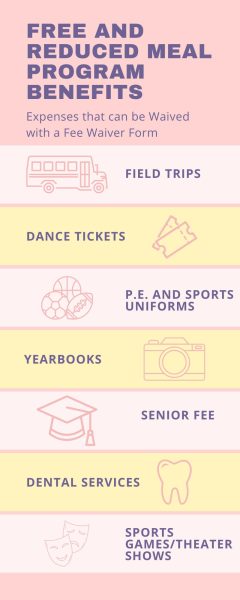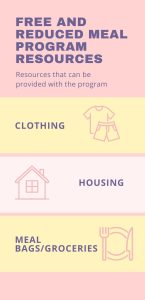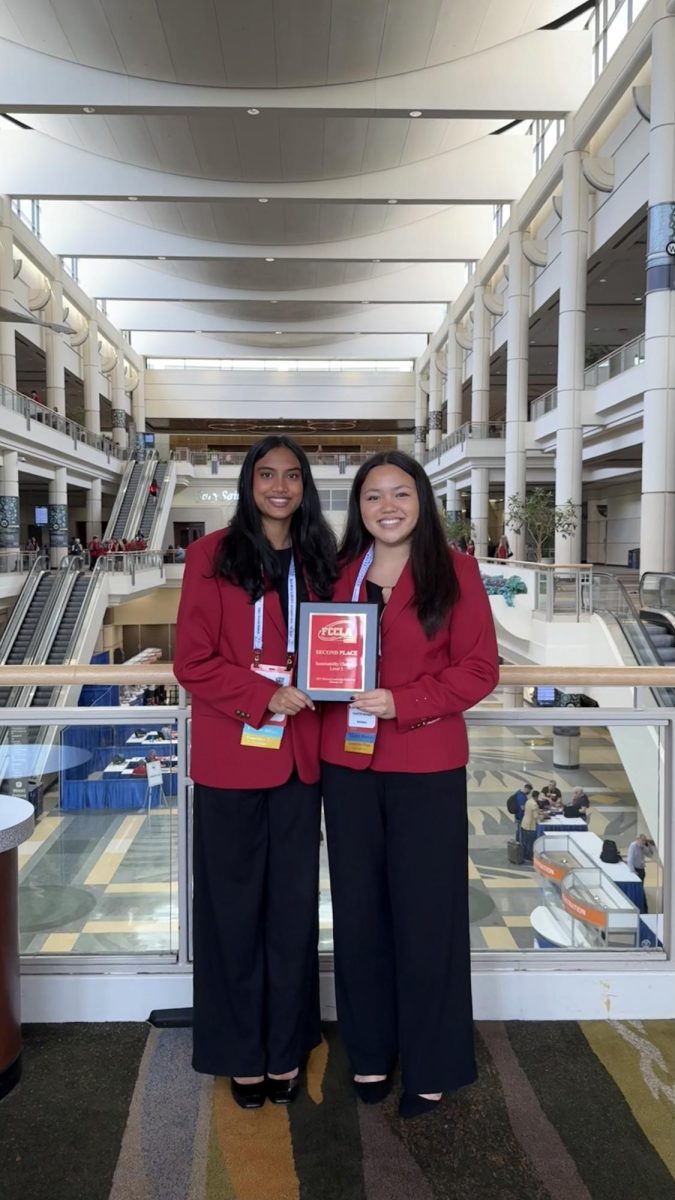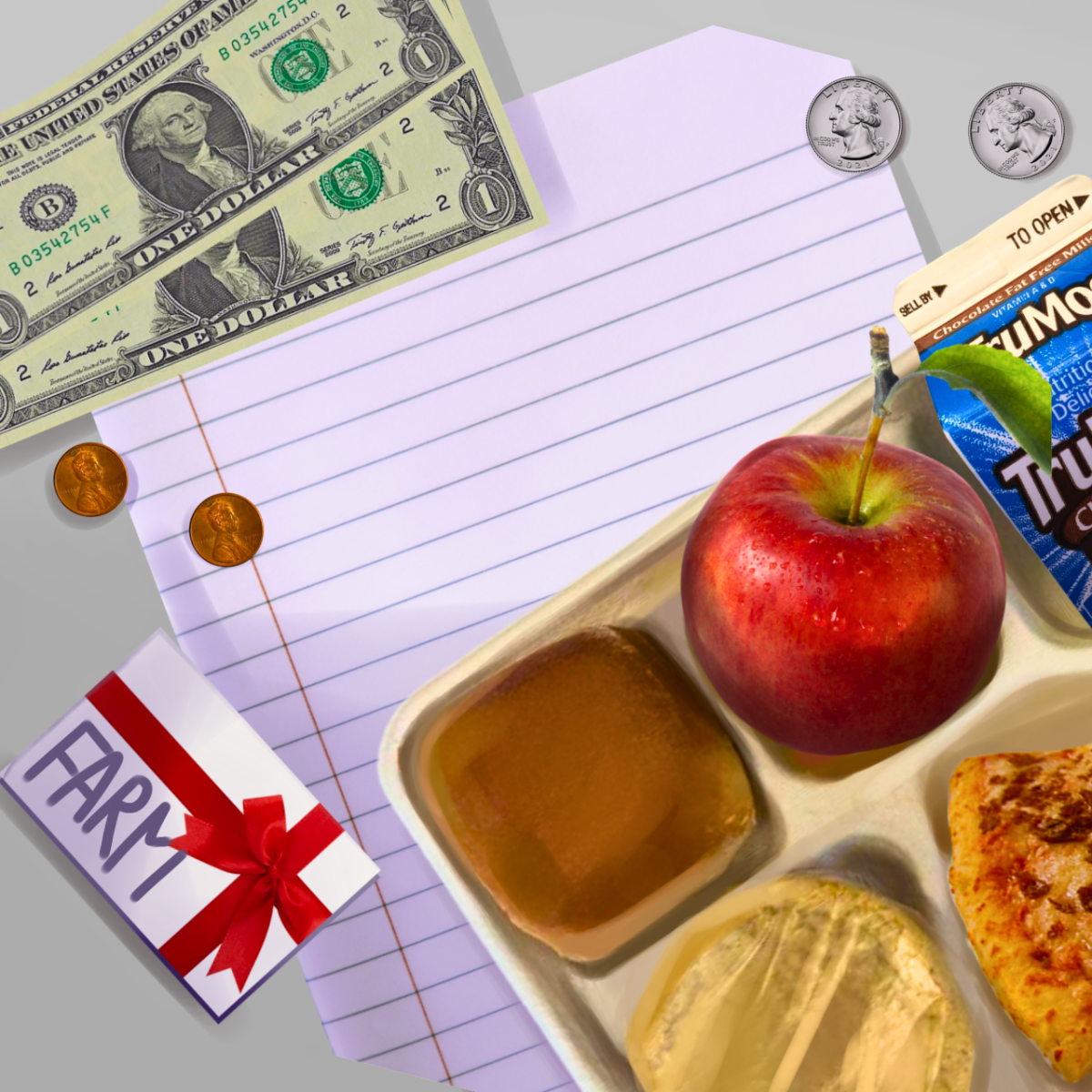Rock Ridge students with financial need can feel overlooked living in Loudoun County, the highest-income county in the U.S. Families may feel an expectation to provide home-cooked lunches and afford field trips or prom tickets to enable their students a high school experience that is similar to their peers.
Unfortunately for some, home-cooked lunches and prom tickets are unobtainable. “[It feels very weird to live in a rich county], but it’s something you get used to,” a Rock Ridge student who is part of the Free and Reduced Meals program, and who wishes to be kept anonymous, said. “You’re on the bus, and you’re seeing the houses and the cars, and you’re just like ‘Wow, people are living.’”
LCPS’s Free and Reduced Meal (FARM) program seeks to support families facing financial hardship by providing eligible students with a free breakfast and lunch every day. Students admitted to the program can receive additional benefits, including fee waivers for the SAT, prom tickets, field trips, PE and sports uniforms, yearbooks, and graduation fees, and other expenses.
However, at Rock Ridge, many students don’t take advantage of these opportunities. 19.07% of Rock Ridge students have applied to this program, but even when admitted, not all participate in it. Participation is tracked by the amount of students who are part of the FARM program and get lunch at the cafeteria every day.
According to Teresa Lucas, the management coordinator of National School Nutrition (NSN) at LCPS, the 40 million dollar FARM program supports 14,594 students at LCPS, 17.71% of the student population. A family can save up to $950 per child if the student is eligible and admitted to FARM. When purchasing a meal, a FARM program student gets charged zero dollars, and the federal government reimburses all costs of a student’s breakfast and lunch to LCPS. Lucas claims that recent cuts in federal funding do not affect NSN funding because the National School Lunch Act of 1946 allocated yearly funding to NSN.
According to the Virginia Department of Education (VDOE), the percentage of eligible students that participated in free and reduced lunch at Rock Ridge was only 56.7% in the 2023-2024 school year. Based on available data in the current 2024-2025 school year, from May 1 to May 16, 55.83% of meals were served out of all eligible students in FARM. This means that only a little over half of eligible students are consistently taking advantage of the program.
Miscommunication about how the program functions and a dissatisfaction of meal options may contribute to low participation.
Rock Ridge Family Liaison Sophia Saib tries to connects students with the resources LCPS provides to families with financial need. “ None of our students should face hunger and food insecurity,” Saib said. “ Some families try to find alternate ways to provide lunch for their students. They don’t realize that this is a great platform because it doesn’t only provide free breakfast and free lunch, but it opens avenues to so many other resources that your family may need and have a challenge paying for.”
“Many students may feel self-conscious about receiving free lunch,” Saib said. “They are uncomfortable because they think their peers may judge them. I think what needs to be cleared out is that at Rock Ridge, confidentiality is absolutely prioritized. We protect the students’ privacy, and you can see that from the way the lunch is taken at the cafeteria.”
Rock Ridge cafeteria manager Sherri Foster-Craft ensures the program’s confidentiality at the lunch counter. “If you’re hungry, and you are too embarrassed to come in and get a meal, that’s sad [and] that’s terrible,” Foster-Craft said. “So, we have tried to put things in place where we can’t talk about [the student’s situation], especially at the register. We can’t even see [that the student is in the program] unless the students ask ‘how much money do I have on my account?’ It’s just a lot of privacy all around, not just with kids that are free and reduced.”
To guarantee a seamless process for getting families approved into the program, multiple departments within LCPS work together to ensure the application process stays fair and confidential. Saib can connect families in need with the application material, which is then independently processed by LCPS Nutritional Services. Eligibility is based on household size and monthly income. If a student is admitted into FARM, neither Saib nor the cafeteria workers will be notified to protect the students’ privacy.
Once admitted, students must follow LCPS’ requirements for a “complete” meal in order to receive a reimbursable lunch. A complete meal tray holds three to five food groups: at least one fruit or vegetable, an entrée composed of protein or grain sources, and an optional juice or milk carton. Many students admitted to the program aren’t aware of these requirements or that their parents signed them up for FARM – they leave out the necessary fruit, and their meal consequently gets charged for the regular price.
To prevent students from getting charged, Saib and Foster-Craft privately take students that they know are in FARM to the cafeteria and demonstrate the process for how to get all the necessary components for a free meal.
Low participation in the FARM program can also be attributed to students disliking cafeteria food choices. The U.S. The Department of Agriculture (USDA) provides strict guidelines for school cafeterias to follow requiring food ingredients to meet health standards. Lucas believes these regulations might decrease the appeal of getting food at the cafeteria.
“We have to follow nutrition guidelines, so it’s lower sodium and lower sugar,” Lucas said. “Sometimes, the healthier items aren’t really the things that people want to eat, but we do try to make the foods nutritious and delicious.”
To make lunch more appealing, NSN is working to adjust the LCPS lunches to better suit the student population and culture of each school in hopes of increasing cafeteria participation. “If you come from a middle Eastern culture or Asian culture, maybe the flavor profile isn’t what you’re used to,” Lucas said. “But we do try to offer cultural dishes. We have cha Rice – an African dish, a lentil dish, Sato – Hispanic, and Asian entrees – dumplings, noodles. So, we try to have a variety of cultural items.”
In addition, LCPS nutrition works to improve menu options by offering taste testing at some school cafeterias to gauge students’ preferences on what food choices they enjoy.
Although the menu adaptations are supposed to reach all LCPS schools, according to Foster-Craft, these changes have not been implemented at Rock Ridge. According to Foster-Craft, while the cafeteria at Rock Ridge has offered some taste testing opportunities in the past years, they have not not offered any this year. This has resulted in less student feedback on cafeteria food preferences, making Rock Ridge unable to adapt dishes based on the taste buds of the Rock Ridge student population.
“The recipes that we have are not what they’re familiar with at home,” Foster-Craft said. “There’s not those home options that everybody loves. The students here don’t eat much beef, but in other schools, they eat a lot of beef. I wish we could tweak it a little bit more and kind of fit what the taste buds are here instead of what the county’s taste buds are. That might be one reason why our numbers have gone down somewhat.”

In addition to low participation in getting meals, many students are also unaware of the extra benefits that are offered when approved into FARM. To address this gap, Saib encourages students who are facing financial difficulties to join the program and gain additional benefits.
“[Students] mostly know about the school lunch and food, but no one knows about the other stuff [the program can provide you with] like the cap and gown [fee waiver],” A senior part of FARM who wishes to remain anonymous said. “I skipped a lot because I didn’t know about it until my junior and senior year. I could have done a lot more, but I didn’t know what I had access to.”
To help students make the most of their benefits in the FARM program, Saib sends out weekly messages in Principal John Duellman’s newsletters to parents to inform them of opportunities, such as getting fee waivers for prom tickets.
The FARM program receives plenty of community support from the PTSO, Principal Duellman, St. Teresa’s church, and students and parents, providing enough funding to [support] students’ needs. The program also connects students to the Dulles

South Food Pantry and the Dulles South Neighborhood Closet. All programs and initiatives that students and families can partake in are made as confidential as possible, as there are specific time slots for appointments to ensure privacy.
Additionally, students can join the Backpack Buddy program, where they are able to discreetly take bags home that the school provides filled with snacks, meals, and groceries, during times where they won’t have access to food at school, such as the weekends.
“ If you have the resources in the community that you’re living in, we don’t want your child to be hungry at school,” Saib said. “We want them to access these resources and everything else that the school can offer to support your child, so they can have all the opportunities that every child has.”
Families are able to apply for the program online as well as on paper. The online application is said to be “faster and safer” than the physical paper copy.
To learn more about the FARM program, or to enroll, explore the resources below:
- Check eligibility by identifying household size and family income
- If eligible, find the online application
- If you have no access to internet at home, reach out to Sophia Saib for details on a clinic to complete the application at
- Complete the required steps (provide contact information, family income, and the last four digits of your Social Security number)
- To complete the paper application, reach out to family liaison, Sophia Saib
- Students must reapply to participate in FARM at the end of every academic year for the upcoming year, even if already admitted to the program
- Follow the requirements for a complete meal (Grain source + protein source + vegetable/fruit + drink) to receive a reimbursable lunch
For additional details on the application process, refer to the LCPS website or reach out to family liaison Sophia Saib.


























![The Phoenix varsity volleyball team lines up for the national anthem. “We were more communicative [with each other] during this game, and I feel like we kept our energy up, especially after the first set,” senior Jessica Valdov said.](https://theblazerrhs.com/wp-content/uploads/2024/10/DSC_0202-1200x800.jpg)










![Junior Alex Alkhal pitches the ball. “[I] just let it go and keep practicing so we can focus on our goal for the next game to get better as a team,” Alkhal said.](https://theblazerrhs.com/wp-content/uploads/2025/05/DSC_0013-1-1200x929.jpg)



























